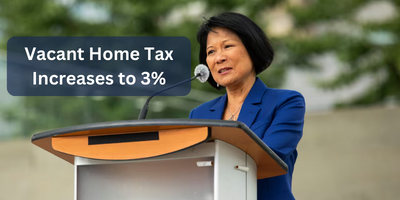Toronto Vacant Home Tax Increases to 3% Amidst Housing Shortage
As Toronto continues its mission to address the housing crisis, the city’s Vacant Home Tax has become a focal point of discussion and action. For those unfamiliar, the Vacant Home Tax is a levy imposed on properties that remain unoccupied for a significant portion of the year, with the goal of incentivizing property owners to sell or rent these dwellings. This move aims to increase housing availability and curb speculative property holding. As the city unveils new adjustments and council members weigh in, we delve into the latest developments in this edition. For readers seeking a comprehensive overview of the tax’s inception and mechanics, we invite you to revisit our in-depth article about the Vacant Home Tax.
Vacant Home Tax: City Council’s 21-2 Decision in Recent Vote
Toronto’s city council voted 21-2 to increase the vacant home tax from one percent to three percent of a property’s assessed value. This hike, supported by Mayor Olivia Chow, responds to the city’s growing housing crisis.
The council approved a motion to direct at least $10 million from the tax hike to a city housing program. This initiative is for non-profit housing operators to buy private market rental housing.
The new tax rate will be in effect from the 2024 tax year. Introduced in 2021, the tax aims to push owners to sell or rent out their vacant properties. Currently, if a home is unoccupied for six months or isn’t the owner’s primary residence, it’s taxed at one percent of its value. Evading the tax can result in fines between $250 to $10,000.
Results from Year One: $54M Revenue Generated
The first year of the vacant home tax brought notable compliance from homeowners. By February’s end, 95% of owners had declared their properties either occupied or vacant. While over 2,160 homes were initially declared vacant, the city ultimately categorized a total of 17,400 homes as such, subjecting them to the tax.
While there were specific exemptions to this tax, such as properties undergoing repairs or homes vacant due to the owner’s death, the revenue generated was significant. The city collected $54 million, aligning with initial projections. Mayor Chow’s vision for these funds is clear: acquire older structures to ensure long-term affordable housing for tenants, further emphasizing the city’s dedication to addressing the housing crisis.
An Effort to Address Housing Crisis: Tax Aims to Boost Supply
Boosting the tax rate is projected to significantly elevate the annual revenues: approximately $105 million in 2025, dropping slightly to around $95 million in 2026, and stabilizing at a minimum of $87 million in subsequent years. However, some city staff question if this is the best avenue for revenue generation.
The council approved various amendments to the tax structure. Among these changes is Mayor Chow’s initiative to funnel additional tax revenue into a city program focused on acquiring and safeguarding affordable housing units. A two-year tax exemption has been introduced for newly constructed houses.
Additionally, an insightful motion by Coun. Paula Fletcher ensures that units listed on short-term rental platforms, like Airbnb, for over 28 days without a formal lease, are now taxable. Fletcher highlighted that this fills a previous gap, preventing long-term rentals from being diverted to short-term platforms.
Recognizing the personal challenges faced by families, the council also extended the tax exemption period for properties of deceased owners from two to three years, following a motion by Coun. Anthony Perruzza. It’s crucial to understand that the vacant homes tax is one among many measures being explored to rejuvenate Toronto’s finances, especially post-pandemic.
Mixed Responses to the Vacant Home Tax Increase
Ausma Malik, representing Ward 10, Spadina-Fort York, supports the tax hike, highlighting its potential to transform empty units into homes. She stated, “Empty units that can be homes for people who need them in this city.” Malik believes the increased tax could further alleviate the city’s housing woes.
In contrast, Coun. Stephen Holyday of Ward 2, Etobicoke Centre, expressed reservations, suggesting the increase might be more about revenue than housing solutions. “I fear that it is about the money,” Holyday remarked. He emphasized the challenges residents face, noting, “It’s not always the story of a rich landlord that’s just allowed a vacant unit to sit there.”
————————————-
Disclaimer
The content provided in this article or blog is for informational purposes only. It is not intended to constitute legal advice or to replace the advice of a qualified legal professional. While we strive to provide accurate and current information, the law is complex and constantly changing, and each person’s circumstances are unique. Therefore, you should not rely on this information as a substitute for professional legal advice. This information does not create an attorney-client relationship between you and our law firm. We strongly recommend that you consult with a qualified attorney in your jurisdiction to understand your legal rights and obligations. Always seek legal advice before making any decisions that may impact your legal rights or obligations.





